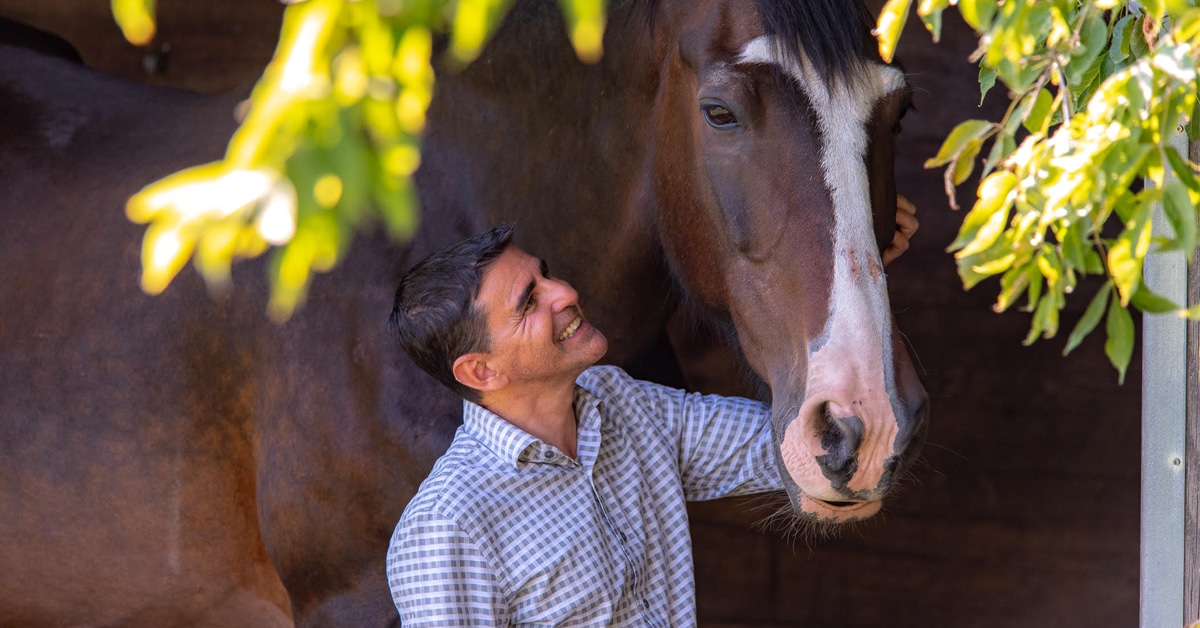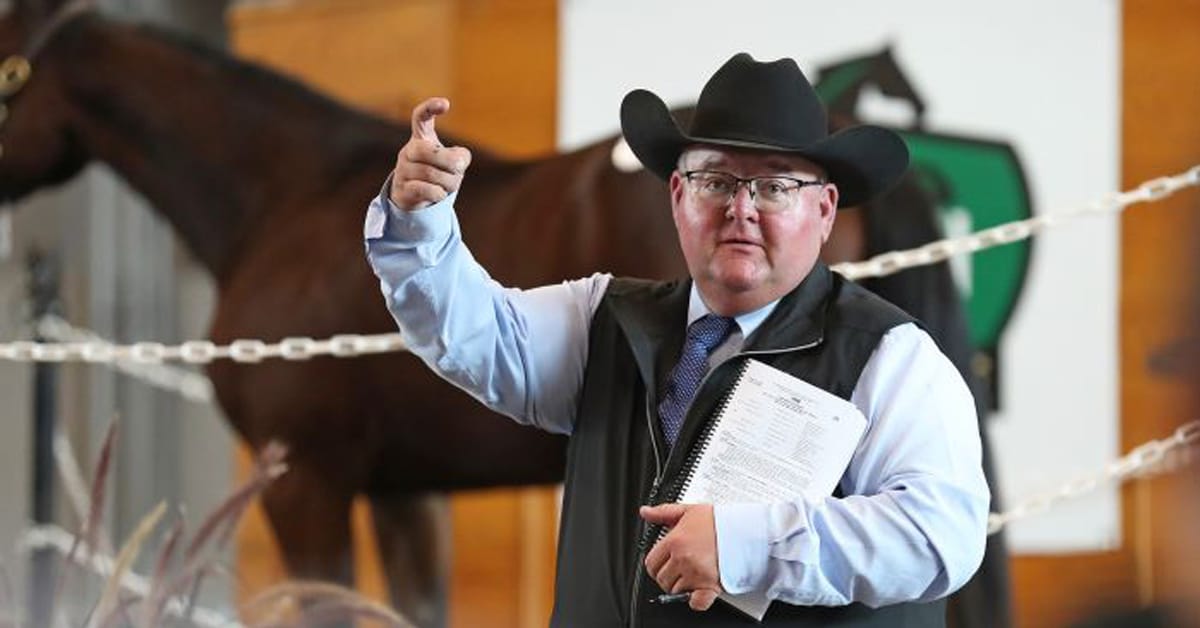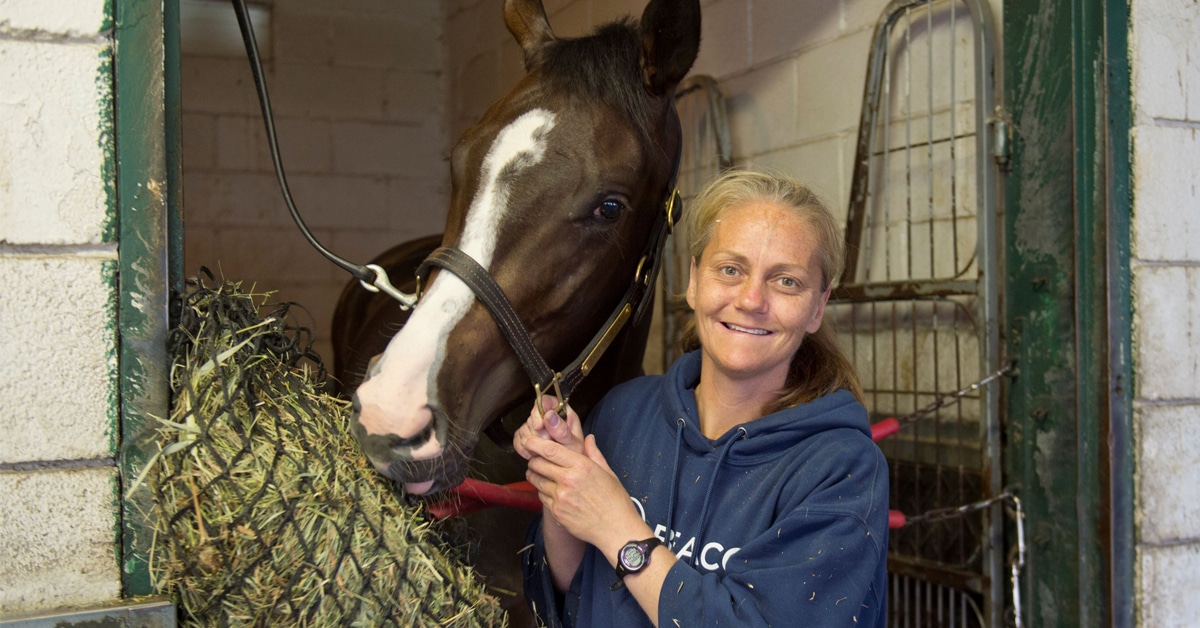Jim Lawson entered the board room at Woodbine racetrack for one of his first directors’ meetings as Chief Executive Officer of Woodbine Entertainment with a plan in hand. It was 2015 and horse racing in Ontario had been crushed just two years earlier when the provincial government shut down the slots-at-racetracks partnership program.
Lawson, who had joined the Woodbine board seven years earlier when called upon to assist with a stalled real estate deal, presented two ideas: Standardbred racing would move to Mohawk year-round (rather than splitting dates with Woodbine) and the inner harness track at Woodbine would be made into a second turf course.
“There was dead silence; no one said a word for about a minute,” remembered Lawson. “I said, ‘Well I guess that didn’t go over very well.’”
But Lawson’s plan went ahead and did very well.
It’s now November 2023 and Lawson has stepped down as CEO of Woodbine Entertainment, returning to executive chair of the board, a role he had at one point when he joined the not-for-profit company. Michael Copeland has taken the reins from Lawson, who set a course of action to successfully pull Ontario racing out of the fire a decade ago and set it back up on better footing.
And while Lawson looks forward to a bit more free time to spend with family, his love for the industry and determination to see the coveted land it sits on developed for the better of racing and the surrounding community is still a focus.
Horse racing and Woodbine were prominent in Lawson’s life as a young man. His father, Mel, was an athlete and sportsman; in fact, he was the youngest quarterback to win a Grey Cup. He followed his own father into the lumber business and then bought his first racehorses in the mid-1960s under the banner of Jim Dandy Stables.
Jim, one of three children, gravitated to hockey, played in the Montreal Canadiens organization and then achieved a degree in economics and his lawyer’s degree. He could be found at the track occasionally when Mel’s horses won a big race, but the younger Lawson embarked on a successful career as a real estate and financial lawyer. His projects took him everywhere, including Mexico and Hungary, and he is quick to credit the law firm he worked for – Davis, Ward & Beck – for his career success.
“It was the best money Woodbine has ever spent and one of the best things I ever did because now we have an auditorium, hotel and casino there.”
Working in horse racing was not on his radar until 2008 when Woodbine approached him to help them with a real estate quandary. Woodbine had entered into an agreement with the Cordish Company, based in Baltimore, to build Woodbine Live!, an entertainment and retail development on 200 acres.
“Woodbine came to me in 2007 and asked me to come on the board and create a real estate committee of one. They had leased some property to them, but nothing was happening.”
Lawson agreed and spent some time with the Cordish Company before finally buying them out of the ground lease “for not very much money. It was the best money Woodbine has ever spent and one of the best things I ever did because now we have an auditorium, hotel and casino there.”
Crash
Lawson took over as acting chair of Woodbine Entertainment in 2012 and executive chair the following year. David Willmot, a previous CEO and president and owner of the famed Kinghaven Farms, was soon to step down as chair of the board after playing an integral role in lifting Woodbine out of near bankruptcy and ushering slot machines into Ontario tracks.
“I guess I was the younger, aggressive-working lawyer type and I was making contributions,” said Lawson.
But the bottom was soon to fall out as rumblings of the province cancelling the lucrative 20 percent share of slot machine revenue to Ontario tracks came to the fore. The province wanted the $350 million share back, not convinced that it was being used wisely in racing.
“I had been working hard to gain the trust of the [Premier] Dalton McGuinty government, part of which was changing the governance of the Woodbine board.”
Lawson was involved in negotiations with the province and Minister of Finance Dwight Duncan, who was keen to crush horse racing to lighten the province’s debt.
“I went to a meeting with the Deputy Minister of Finance [Steve Orsini] to negotiate the slot revenue terms. Maybe 20 percent was too much and I thought we had agreed on 16 percent which would have saved the industry. But when I met with the chief of staff for the Premier, it was like the conversation had never happened. I was so disheartened.”
“Those were dark days for Woodbine,” said Lawson. “If we stood still, we were dead.”
Culture change and transition
The slots-at-racetracks partnership program was cancelled in 2013. Woodbine had to let some 300 people go and many horsepeople left the business.
“Those were dark days for Woodbine,” said Lawson. “If we stood still, we were dead. We had just lost three hundred people and lost revenue.”
Lawson polled his board for the one thing that needed to be changed and it was almost unanimous – the culture of the company.
“It was very hierarchical and people were afraid to make decisions [on their own]. We emboldened our people in the racing department, food and beverage and marketing so that they could work together and make decisions.”
More urgently, the Ontario horse racing industry needed funding. Woodbine CEO Nick Eaves had announced at the post position draw for the 2012 Queen’s Plate that there might not be a Plate the following year if the slots program was not reinstated or funding was made available.
Negotiations for transitional funding were “ugly and difficult” to the point that Lawson said Mohawk would have to close and the land sold. When revenue from the banking machines at Mohawk and Woodbine was added to the funding number, a deal was finally made in 2013 for a short-term plan.
In 2019, Lawson and Bill Ford were the key figures in negotiating a long-term funding plan with the province – some $105 million annually over 19 years for the province’s many tracks. “The Ontario Lottery and Gaming wanted a lead in the program and Woodbine is responsible for the funds. Hats off to the racing industry. There were many discussions on what Thoroughbreds, Standards and Quarter Horses would get and we were ‘stronger together’ working it out.” This program is set to be re-examined in 2026.
Lawson put some $10 million in upgrades into the newly-christened Woodbine Mohawk and built a brand that has made the Campbellville track one of the major hubs for Standardbred racing in the world.
And then the pandemic hit.
For two years, Woodbine and its horsepeople were either shut down from racing or competing in a shortened season. Lawson was in regular discussions with Premier Doug Ford and the health ministry as well as Toronto’s lead physician, Eileen de Villa, emphasizing that horse racing was an outdoor, safe activity. Racing did end up in the first tier in the re-opening schedules during the pandemic.
Horsepeople. represented by the Horsemen’s Benevolent and Protective Association on the Thoroughbred side, received the unused purse money following its talks with the Alcohol and Gaming Commission of Ontario with Woodbine.
2023
In the summer, Lawson announced his intention to step down as CEO in November, but to stay on as executive chair.
“I had been on a treadmill working at the law firm after working in investments for ten years. I was the type of father that didn’t end up at birthday parties,” said Lawson. “When [daughter] Brodie started thinking about getting married and having children [she now has two] I decided I would spend more time with my family.”
That doesn’t mean that Lawson will not be helping the new regime work it way through numerous issues that present challenges for horse racing. Construction on the new casino, a 5,000 seat theatre, hotel and retail was slowed by Covid, but the casino and hotel are now open.
“Woodbine receives a small percentage of rent, but it has been a much slower start than we anticipated,” said Lawson. “And we are not getting the traffic flow, partly because of all the construction still going on, partly because of on-line gaming.”
Online sports betting, which became legal in Ontario several years ago and launched earlier this year, has been a major focus for Lawson, who first had to get racing integrated but strictly on a pari-mutuel basis and then finally make a deal with its first platform, bet365. He continues to pursue sportsbooks and racetracks, a natural fit, and has been frustrated no traction has been collected in that effort.
On November 22, Woodbine held its latest ‘Stronger Together’ town hall meeting on the backstretch with horsepeople. The idea of having in-person meetings and question-and-answer sessions with horsepeople was originated by Lawson, but it was the first one he did not attend. Instead, Copeland and Bill Ford, recently announced General Counsel and Executive Vice President of Racing, were present on the panel and spoke with Jim’s son Tim, recently named vice president of Thoroughbred Racing.
Horsepeople were presented with the current business numbers for wagering on the Woodbine races; home market wagering is down almost nine percent and overall wagering is down just one one percent. Field size and wagering per day were steady.
“We are on a decent foundation relative to where we were. But we are at a standstill with purses while other jurisdictions are raising purses.”
Future thinking
Two days after the town hall meeting, Lawson’s own gelding Stronger Together scored a timely and fitting win in a 1 1/16 mile claiming race at Woodbine. Afterward, he talked about what is facing horse racing in Ontario going forward.
“We are on a decent foundation relative to where we were. But we are at a standstill with purses while other jurisdictions are raising purses. Our wagering is off eight or nine percent on the home market and it is going to be tough to turn that around.
“We are sitting here somewhat on an island in terms of horse population, horse supply is low. Where do we get horses from? Kentucky, other states, but the Canadian dollar is low. It’s difficult to get barn help across the border, they don’t understand the HST and the purses are less. We miss the big stables like Mr. Schickedanz, Mr. Graham, Sam-Son, all of those big ones that provided 150 horses.”
Lawson noted that while many other racetracks don’t operate with incentive to increase handle, merely save cost, Woodbine is dedicated to creating a racing experience with dining rooms, outdoor patios, and special racing dates such as the King’s Plate and more.
“But this industry is not structured very well and the funding agreement which is locked in for the next 15 years is not offering any increases. The money is spread too thin. Something has to change in the next couple of years or we are going to lose any ability to compete.”
Meanwhile, expenses for owners and trainers continue to rise, something that is not lost on Lawson, who has more than a dozen horses himself.
“I’m trying to figure out if I can make a go at it, my races don’t fill either. I’m just hoping to grab that second- or third-place finish so I can pay the trainer for the next month. It’s hard and I get it.”
Lawson said wagering could be increased if Woodbine cancels the premium charged to Computer-Assisted Wagering (CAW). “Woodbine has refused to offer a discount for CAWs to come into Woodbine and wager on our races. This would hurt the everyday bettors, take away their profits. We don’t do it at other tracks (Woodbine receives most of the wagering through its HPIBet platform) so some 40 to 50 percent of the wagering at Fort Erie and other tracks is from CAWs.”
Fort Erie’s racing season and the Woodbine summer policy that horses, in general, cannot stable at Woodbine and race at Fort Erie was a hot topic at Stronger Together. The policy will not change but Lawson notes that Woodbine has attempted to work with Fort Erie to have a single race office operated by Woodbine for both Ontario Thoroughbreds tracks, similar to what the Standardbred side has (Woodbine is the race office for most of the harness tracks).
“We would not write races here for less than $10,000 at Woodbine and in turn for that we wouldn’t be writing allowance races down at Fort Erie. Then we wouldn’t lose horses and we would write races that complement each other’s program. Right now, we are competing with each other and there are not enough horses to compete with each other.”
And the legalization of historical racing is also a sticking point for Lawson. Historical racing – betting on very old races in slot machine style – has rejuvenated racing in Kentucky. Lawson believes if the machines passed in Canada, it would benefit the industry.
Lawson references the Woodbine casino as something that he believes is his biggest regret. “I wish I had stood firm and had Woodbine operate the casino: We have good governance, we are not-for-profit and we could have done the right thing for the province.”
Lawson says he would like to see some consolidation in Ontario racing. “The government needs to take a hard look at how racing is structured. I’m stepping back but hopefully will be strategically guiding the Woodbine management team.
“I love the industry and I led it through some of the most challenging times in our history. I feel I can look in the mirror and feel we are in a much better position than we could have been, and that I did my best.”
The Latest










